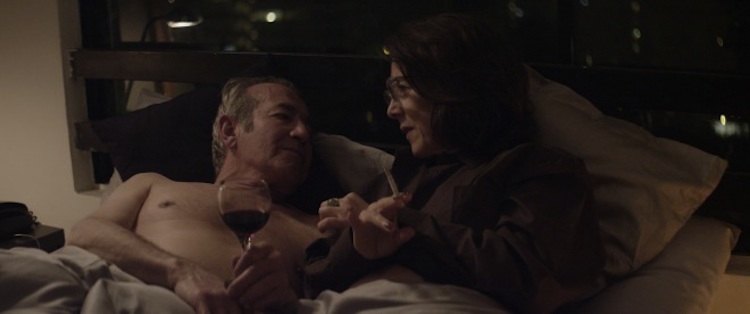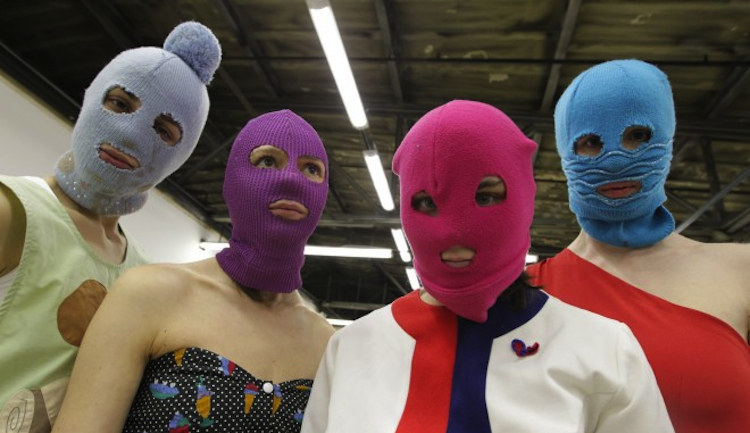Antidotes to Valentine’s Day: ‘Gloria’ and ‘Pussy Riot: A Punk Prayer’
Skip the romcom and see these two smart indie films
Share

Rivalled only by New Year’s Eve, Valentine’s Day is a dating minefield. Whether married or single, you head to a restaurant, or a movie, at your peril. In either case, the meal or the romcom, the result is often a cloying confection, tailored all too closely to the occasion. In my scaled-back role as a Contributing Editor with Maclean’s, I’m now seeing only those films I really want to see, or need to see to be part of “the conversation.” Consequently, I happily skipped advance screenings of Hollywood’s designated Valentine’s Day releases—A Winter’s Tale, About Last Night and Endless Love—the last two of which are remakes. It was quite enough to watch their Hallmark-card trailers.
Whether by serendipity or design, Valentine’s Day also marks the Canadian release of two smart indie films about women who are unabashed romantics, but of a less conventional kind. Gloria is the bittersweet tale of a spirited middle-aged woman looking for love against all odds, and Pussy Riot: A Punk Prayer is a remarkable documentary about Russia’s infamous girl group of art-rock subversives. I saw the former at TIFF last fall and the latter almost a year ago at Hot Docs, but both stick in the memory as two of the better films at their respective festivals.
Gloria
Seeing Gloria makes you realize it’s possible to portray middle-aged romance, and sex, without resorting to goofy caricature. When Hollywood goes there, we end up with a Nancy Meyer movie that has giddy scenes of Jack Nicholson bumping into a naked, shrieking Dianne Keaton (Something’s Got to Give), or Meryl Streep giggling her way into bed with Alec Baldwin (It’s Complicated)—as if nothing could be more ridiculous than a meeting of aged flesh. But Gloria comes from Europe, where older women seem to get more respect, at least on screen.
Paulina García won best actress at the 2013 Berlin International Film Festival for her delightful performance in the title role. She plays a divorced Chilean woman in her late 50s who’s unwilling to give up on romance, and refuses to drift into domesticity as a grandmother. She spends her evenings at singles clubs, dancing the night away with an air of coquettish optimism, looking for a tolerable man despite the grim odds of finding one. Hope arrives in the form of Rodolfo (Sergio Hernández), a naval officer, who is smitten with her from the first dance, but the fact that he is so recently separated suggests this liaison will not be smooth. Also, while Gloria seems almost disinterested in her two adult children, Rodolfo dotes on his two grown daughters to the point of distraction
With his fourth feature, Chilean filmmaker Sebastián Lelio directs with a sensitive eye, and lets the narrative wrap seamlessly around García’s beguiling performance. Her wry, circumspect attitude, mixed with a measure of naivete, infuses the whole film. This is a woman ready to take her chances and surrender to passion, but not at the expense of her self-respect. Implicitly feminist, Gloria is realistic portrait of a mature woman coming of age before it’s too late, and though it’s as modest and straightforward as its heroine, it’s exotic—a kind of film we haven’t seen before.
Pussy Riot: A Punk Prayer
If you think you know about this feminist punk group from the media coverage of their trial, and Madonna’s flashes of solidarity, that’s not the half of it. Filmmakers Mike Lerner and Maxim Pozdorovkin, who won a special jury award in Sundance for this documentary, have forged a riveting account of the court case. But most of all, they have composed an fascinating and credibly heroic portrait of the three Pussy Riot members who go to trial. For all their collective bravado, they emerge as distinct and formidable personalities, who seem to be undergoing a personal transformation as the camera rolls—especially the mesmerizing Nadia (Nadezhda Tolokonnikova), who combines movie-star magnetism with insouciant wit and a sophisticated view of conceptual art. The film includes video clips of the the group’s hit-and-run performances and interviews. But their most revealing moments come from their candid conversations as prisoners behind the glass of the court’s media scrum. Like animals in a zoo, surrounded by a phalanx of cameras, they use their trial as a stage for impromptu performance art. Supporting players range from biker-like militants of the Orthodox church to the girls’ anxious but tolerant parents—notably Nadia’s father, who co-wrote lyrics for the punk anthem that landed them in jail after its fleeting performance in the church.
When this documentary was first released a year ago, the members of Pussy Riot were still behind bars and their situation seemed dire. A what was most shocking to Western eyes is how little support they seemed to have among the people. Between the paltry turnouts for protests against their arrest and interviews with average Russians, the film makes it clear that these riot girls failed in winning the masses to their cause. In the West, however, they became celebrities. And now that Putin has released them in a burst of Olympic glasnost, they’re finding an audience on U.S. talk shows, preaching to the converted. If they could only make it as a girl band in America, the Russian people may start paying attention.
